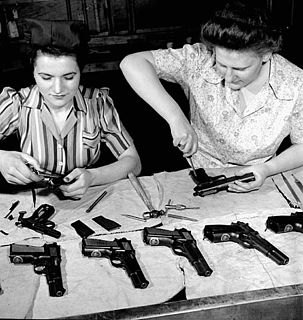At common law, damages are a remedy in the form of a monetary award to be paid to a claimant as compensation for loss or injury. To warrant the award, the claimant must show that a breach of duty has caused foreseeable loss. To be recognised at law, the loss must involve damage to property, or mental or physical injury; pure economic loss is rarely recognised for the award of damages.
The False Claims Act (FCA), also called the "Lincoln Law", is an American federal law that imposes liability on persons and companies who defraud governmental programs. It is the federal Government's primary litigation tool in combating fraud against the Government. The law includes a qui tam provision that allows people who are not affiliated with the government, called "relators" under the law, to file actions on behalf of the government. Persons filing under the Act stand to receive a portion of any recovered damages. As of 2019, over 71 percent of all FCA actions were initiated by whistleblowers. Claims under the law have typically involved health care, military, or other government spending programs, and dominate the list of largest pharmaceutical settlements. The government has recovered more than $62 billion under the False Claims Act between 1987 and 2019.

The Posse Comitatus Act is a United States federal law signed on June 18, 1878, by President Rutherford B. Hayes which limits the powers of the federal government in the use of federal military personnel to enforce domestic policies within the United States. The Act was passed as an amendment to an army appropriation bill following the end of Reconstruction and was updated in 1956 and 1981.

United States v. Schooner Amistad, 40 U.S. 518 (1841), was a United States Supreme Court case resulting from the rebellion of Africans on board the Spanish schooner La Amistad in 1839. It was an unusual freedom suit that involved international issues and parties, as well as United States law. The historian Samuel Eliot Morison described it in 1969 as the most important court case involving slavery before being eclipsed by that of Dred Scott in 1857.
United States v. Klein, 80 U.S. 128 (1871), was a landmark United States Supreme Court case stemming from the American Civil War (1861–1865).

The Espionage Act of 1917 is a United States federal law passed on June 15, 1917, shortly after the U.S. entry into World War I. It has been amended numerous times over the years. It was originally found in Title 50 of the U.S. Code but is now found under Title 18. Specifically, it is 18 U.S.C. ch. 37
Extraterritorial jurisdiction (ETJ) is the legal ability of a government to exercise authority beyond its normal boundaries.

The arms industry, also known as the defense industry or the arms trade, is a global industry which manufactures and sells weapons and military technology, and is a major component of the Military–industrial complex. It consists of a commercial industry involved in the research and development, engineering, production, and servicing of military material, equipment, and facilities. Arms-producing companies, also referred to as arms dealers, defense contractors, or as the military industry, produce arms for the armed forces of states and for civilians. Departments of government also operate in the arms industry, buying and selling weapons, munitions and other military items. An arsenal is a place where arms and ammunition - whether privately or publicly owned - are made, maintained and repaired, stored, or issued, in any combination. Products of the arms industry include guns, artillery, ammunition, missiles, military aircraft, military vehicles, ships, electronic systems, night-vision devices, holographic weapon sights, laser rangefinders, laser sights, hand grenades, landmines and more. The arms industry also provides other logistical and operational support.

Abd al-Rahim al-Nashiri is a Saudi Arabian citizen alleged to be the mastermind of the bombing of USS Cole and other maritime terrorist attacks. He is alleged to have headed al-Qaeda operations in the Persian Gulf and the Gulf states prior to his capture in November 2002 by the CIA's Special Activities Division.
A mechanic's lien is a security interest in the title to property for the benefit of those who have supplied labor or materials that improve the property. The lien exists for both real property and personal property. In the realm of real property, it is called by various names, including, generically, construction lien. It is also called a materialman's lien or supplier's lien when referring to those supplying materials, a laborer's lien when referring to those supplying labor, and a design professional's lien when referring to architects or designers who contribute to a work of improvement. In the realm of personal property, it is also called an artisan's lien. The term "lien" comes from a French root, with a meaning similar to link; it is related to "liaison". Mechanic's liens on property in the United States date from the 18th century.
In common law, a writ of qui tam is a writ through which private individuals who assist a prosecution can receive for themselves all or part of the damages or financial penalties recovered by the government as a result of the prosecution. Its name is an abbreviation of the Latin phrase qui tam pro domino rege quam pro se ipso in hac parte sequitur, meaning "[he] who sues in this matter for the king as well as for himself."
The Migratory Bird Treaty Act of 1918 (MBTA), codified at 16 U.S.C. §§ 703–712, is a United States federal law, first enacted in 1916 to implement the convention for the protection of migratory birds between the United States and Great Britain. The statute makes it unlawful without a waiver to pursue, hunt, take, capture, kill, or sell birds listed therein as migratory birds. The statute does not discriminate between live or dead birds and also grants full protection to any bird parts including feathers, eggs, and nests. Over 800 species are currently on the list.

In rem jurisdiction is a legal term describing the power a court may exercise over property or a "status" against a person over whom the court does not have in personam jurisdiction. Jurisdiction in rem assumes the property or status is the primary object of the action, rather than personal liabilities not necessarily associated with the property.
The processes of government procurement in the United States enable federal, state and local government bodies in the United States to acquire goods, services, and interests in real property.
Cardwell v. American Bridge Co., 113 U.S. 205 (1885), was a bill in equity, for the removal of a bridge erected by the defendant over the American River in northern California, downriver from the property of the plaintiff on that navigable section of the river.
Harvey v. United States, 113 U.S. 243 (1885), was a case for labor and materials furnished by the claimants in constructing coffer dams in Davenport, Iowa and in performing the work necessarily connected therewith and preliminary to the mason work for the piers and abutments referred to in the contract. That court proceeded on the view that the claimants had no right to rely on the testimony of experts introduced by them as to the value of the work, but should have kept and produced accounts of its cost and expense, but it gave to the claimants the benefit of the testimony of experts introduced by the United States as to such value in awarding the above amount. Held that the claimants could not be deprived of reasonable compensation for their work because they did not produce evidence of the character referred to, when it did not appear that such evidence existed, if the evidence they produced was the best evidence accessible to them and it enabled the court to arrive at a proper conclusion.
Chicago Life Insurance Co. v. Needles, 113 U.S. 574 (1885), was a decision by the United States Supreme Court. It involved the writ of error regarding a denial of a motion and final judgment rendered perpetually enjoining Chicago Life Ins. Co. from further prosecution of its business. From that judgment, a writ of error was prosecuted to the supreme court of the state, where, among other things, was assigned for error the refusal of the court of original jurisdiction to adjudge that the said statutes of Illinois were in violation of the Constitution of the United States. The judgment of the inferior court was in all things affirmed by the supreme court of the state, and from that judgment of affirmance the present writ of error is prosecuted.
Boyer v. Boyer, 113 U.S. 689 (1885), was a suit in error brought in a state court of Pennsylvania for an injunction restraining the commissioners of Schuylkill County from levying a county tax for the year 1883 upon certain shares in the Pennsylvania National Bank, an association organized under the National Banking Act. The suit proceeds upon the ground that such levy violates the act of Congress prescribing conditions upon state taxation of national bank shares in this, that "other moneyed capital in the hands of individual citizens" of that county is exempted by the laws of Pennsylvania from such taxation. A demurrer to the bill was sustained and the suit was dismissed. Upon appeal to the Supreme Court of Pennsylvania, that judgment was affirmed on the ground that the laws of the state under which the defendants sought to justify the taxation were not repugnant to the act of Congress.
Looney v. District of Columbia, 113 U.S. 258 (1885), was a U.S. Supreme Court case testing whether a government contractor could sue for outstanding payment when those debts had already been sold off to other parties. The court ruled a street contractor could not both sell the debts at a discount as a security and also sue District of Columbia for the difference in what they were owed.

The Taiwan Relations Act Affirmation and Naval Vessel Transfer Act of 2014 is a bill that would allow the sale of several Oliver Hazard Perry-class frigates to Mexico, Thailand, and Taiwan. Four naval vessels would be sold to Taiwan for about $10 million each. Mexico and Thailand would each receive two vessels as a grant.





